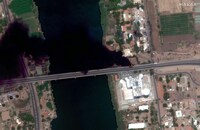“This fighting is the worst it has been in the history of Sudan,” said Ali Bashir, the vice chairman of the Central Committee of Sudan Doctors and a medical officer at Aljawda Hospital in central Khartoum.
Bashir is a veteran of the pro-democracy protests that helped end the three-decade rule of dictator Omar al-Bashir in 2019. He remembers spending three hours back then trying to reach an injured protester under fire. Security forces had shot, beaten and arrested doctors for trying to help demonstrators. Finally, he reached the man, who survived.
Doctors and demonstrators came out on the streets again after a joint 2021 coup by today’s antagonists: Vice President Mohamed Hamdan Dagalo — universally referred to as Hemedti — and de facto president Lt. Gen. Abdel Fattah al-Burhan. Military forces demanded some hospitals hand over protesters when they arrived, media reported.
Since the dictator’s fall, about 40 doctors have been detained, Bashir said, one doctor was shot dead, and five medical students were killed during the protests. But he has never seen such an influx of wounded. The capital has been rocked by gun battles, artillery and even airstrikes for the past two days; delays in seeking medical help meant many patients are bleeding to death on the way, he said, or even on the floor of the hospital as they arrive.
One young father who had been shot in the leg finally arrived Saturday after a relay of volunteers carried him, he said. “The man is 27. He had lost hope and believed he would die,” Bashir said. Doctors were able to treat him and reach his family to tell them he had made it.
Ahmed el Tayyeb, a consultant general surgeon at Khartoum General Hospital, said he had been operating nearly nonstop on gunshot patients for the past 36 hours. On Saturday, the day that fighting erupted, a young kidney transplant patient was coming in for a checkup when he was caught in crossfire, el Tayyeb said.
“People carried him by hand for more than 1 kilometer. We did a splenectomy and he has a bowel injury. We hope he will make it,” he said.
The blood shortages were bad even before fighting began, because of a shortage of blood bags, he said, and now are even worse.
“If a patient needs two units of blood, we will give him one and start operating,” he said. His hospital and many others are near the city center, less than a kilometer from the heavily contested military headquarters, he said.
Two doctors had been killed while sheltering in their homes, he said, and a final-year medical student was shot dead on his way to the hospital Saturday.
“He was a very beautiful person,” el Tayyeb said. “We have not been able to bury him yet.”
In Al-Fashir, a town in the western region of Darfur, Mohamed Abdirahman of King Faisal Specialist Hospital and Research Center said two girls who were about 5 and 9 years old were killed by mortar fire. At least six civilians died and more than 110 wounded came to his hospital Saturday and Sunday, he said.
His small hospital was packed with patients because the larger teaching hospital in the area was too close to the front lines, he said, adding that wounded doctors and patients were lying on the floor and in the courtyard, and staff were scrounging for medical supplies from local pharmacies. Patients requiring amputations were being rushed in and out of the operating room before it could be cleaned, and two exhausted surgeons were working in shifts, he said.



